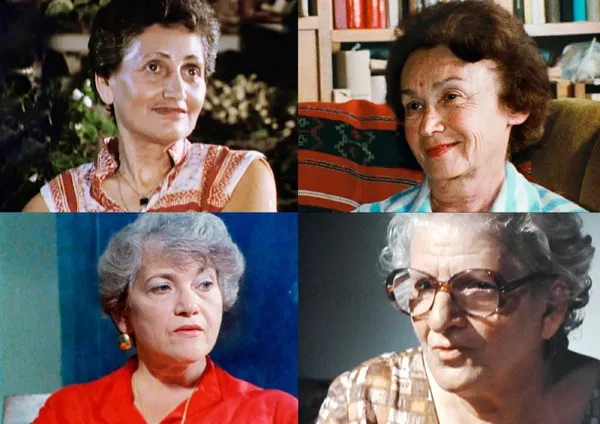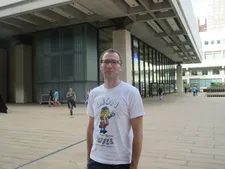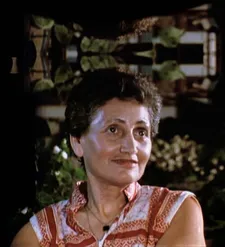During the 55th New York Film Festival in 2017, Claude Lanzmann presented the World Premiere of The Four Sisters (Les Quatre Soeurs) in the Special Events programme. At Lincoln Center prior to the public screenings, I spoke with David Frenkel, the producer of the four films, edited by Chantal Hymans. Frenkel is also a producer for The Last of the Unjust with Jean Labadie (Jim Jarmusch's Paterson, Only Lovers Left Alive, Sara Driver's Boom For Real: The Late Teenage Years Of Jean-Michel Basquiat), Kurt Stocker, and Danny Krausz (Maria Schrader's Stefan Zweig: Farewell To Europe).
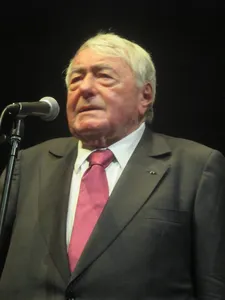 |
| David Frenkel: "What's great working with Claude is that he always surprises you. It was the same with The Last of the Unjust and Benjamin Murmelstein. He was so striking." Photo: Anne-Katrin Titze |
The Four Sisters are satellite films to Lanzmann's incomparable masterpiece, Shoah, each one bringing to light the in-depth testimony of a remarkable woman surviving unspeakable horrors during the Third Reich. The interviews with Hanna Marton, Paula Biren, Ada Lichtman, and Ruth Elias were conducted by Lanzmann in the 1970s, a fact that is quickly forgotten, because what we hear is a timeless, urgent testament about what humanity is capable of inflicting. The women's strength, their dignity and even joyfulness - their embrace of life, not death - is of an eternal importance beyond words.
Claude Lanzmann was aware, more than anyone, of the power in the detail. It is the grounding in the real, that leads directly, even involuntary, to the heart of the spectator. The filmmaker as an interviewer wants the specific; he pushes for details from perpetrators and victims alike. The incidental is anything but inessential. This is why Shoah changed the world. His boundless empathy wanted us to open our eyes.
In his memoir, The Patagonian Hare, he describes a visit to Albert Speer. It began in the afternoon and as the conversation progressed, Lanzmann noted that as darkness fell, Speer never switched on a lamp. When he left, Speer had offered his guest neither drink, nor food, nor light. By describing the Albert Speer school of hospitality, Lanzmann gives extraordinary insight into the man. He does so in his films in a way we may not even notice at first. The camera angles, the way he inserts himself and when, the sounds in the background - the casual is always, as is the case with great art, stupendous. Claude Lanzmann will be greatly missed. A man such as he should never die.
David Frenkel starts out our conversation with how The Four Sisters project evolved.
Anne-Katrin Titze: The Hippocratic Oath for me was by far the most important film at the New York Film Festival.
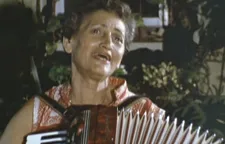 |
| David Frenkel on Ruth Elias in Le Serment d'Hippocrate: "The accordion! The silences! The silences are very important in a movie." |
David Frenkel: Thank you. And so far you had only seen the first film?
AKT: At that point I had only seen that one. I've seen the three others on screeners since. You were also producing The Last of the Unjust, right?
DF: Correct.
AKT: Were there already plans to do The Four Sisters after The Last of the Unjust was finished?
DF: Not at all. He [Claude Lanzmann] called me one day because actually … The true story is there was a book that came out about Claude Lanzmann, published by Éditions Gallimard in France, called Claude Lanzmann - Un voyant dans le siècle. It's texts written by other people about Claude Lanzmann. While doing that, the thought came of telling these four stories in the book. And it was a great idea because it completely makes sense to put these four portraits of female survivors all together. But then we realized, maybe it would be better on film.
AKT: How would it have been in the book? Transcribed?
DF: Transcribed and edited. As you know, in all the work of Claude, most of it, editing is very important in his work.
AKT: Yes, very much so. That is part of his genius. It doesn't look edited at all.
DF: And what you see is not only the footage that has been done in the late 70s when he was shooting Shoah. There is a whole work of editing. To see their faces, to listen to their voices.
AKT: The music in The Hippocratic Oath!
DF: The accordion! The silences! The silences are very important in a movie.
AKT: In The Hippocratic Oath, the dogs barking. Her dog [Ruth Elias]. And it being a German Shepherd, of all things.
DF: Of course. And the fact that we could also hear the sounds of the street in Tel Aviv, which makes things very alive. So for all these reasons it became very quickly obvious that instead of a book ...
AKT: … it had to be a film?
DF: Yes, exactly.
AKT: And in four parts that would be shown together?
DF: That is a very good question. It's for the first time in his career that it's a TV series. Not meant, at least in France, to be screened first in theaters. It's been co-produced by ARTE, the French/German channel. And I asked them: "How do you intend to broadcast?" All together or one after the other - all possibilities can be considered.
This is the world première here in New York. There'll be a huge screening at UNESCO in Paris on January 24, for the anniversary of the liberation of Auschwitz. After that it will be broadcast on ARTE, [it opened theatrically in France on July 4, 2018, the day before Claude Lanzmann died].
AKT: So here in New York is the very first screening.
DF: It's the first. You know, in Shoah, there are many, many characters. For this project, very quickly Claude decided that it would be one film - one woman - one testimony. To put them together and to meld them wouldn't be good.
AKT: No. It is so important that they each get the time to tell their story.
DF: Exactly. In my opinion, as soon as you finish what either Ruth Elias or Paula Biren or Ada Lichtman or Hanna Marton had to say, and the way they say it and the way Claude Lanzmann succeeded in having what he thought was very important, you don't want to jump immediately to a next episode.
AKT: No, you don't.
DF: You need to be with yourself for a long time to really appreciate it.
AKT: More so than ever. You need to be with yourself because it's impossible to put into words. It almost felt sacrilegious for me to put into words what I had seen. For eight days after seeing The Hippocratic Oath it has not left me. It felt as if I were slowly building a barrier around what I saw in this film.
Each time I approach it, I have to overcome the barrier I built. It's as if I am understanding something about humanity that I haven't understood before, emotionally. How did it feel for you seeing the footage for the first time? Unedited, I suppose?
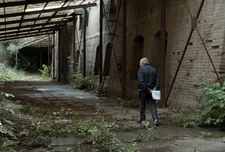 |
| Claude Lanzmann in The Last Of The Unjust at Theresienstadt |
DF: Yeah, it was unedited. What's great working with Claude is that he always surprises you. It was the same with The Last of the Unjust and Benjamin Murmelstein. He was so striking. Claude still had so many jewels, you know, with what he showed? I think at the United States Holocaust Memorial Museum, there are between 200 and 300 hours of rushes from Shoah.
It's very important to see this work as a unique film and that it is four women is also very important. They are all very different. They are from different backgrounds, their way of speaking is different.
AKT: They speak different languages.
DF: They speak different languages. But what gathers them is that they are very brave and they are women. What's really crazy is when you think of a survivor, immediately …
AKT: You think male?
DF: You think male! 50% of the Jewish people who were gassed in Auschwitz were women!
AKT: Did the title The Four Sisters emerge at the end?
DF: No, very early on, as soon as he started working on the film. The titles for the episodes came very late.
Read Arnaud Desplechin's tribute in honour of Claude Lanzmann.
Coming up - David Frenkel on the four women and more on the films in The Four Sisters (Les Quatre Soeurs).











